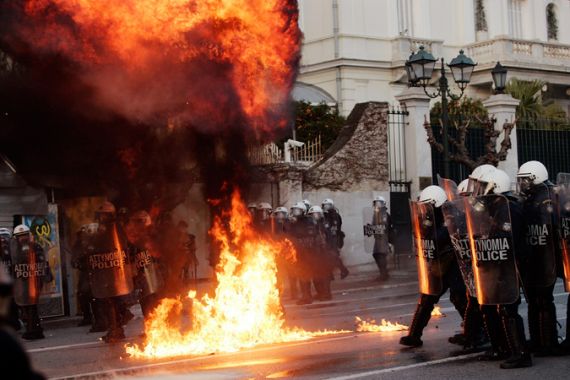Greece’s debt rating raised out of default
Standard & Poor’s upgrades Greek ratings to “CCC”, giving economy a more stable outlook ahead of Sunday’s elections.

Greece has had its debt rating raised out of default by the credit rating agency Standard & Poor’s.
The agency on Wednesday upgraded the country from selective default to “CCC”, which is still in junk status, and gave it a stable outlook, which means no further ratings changes are being considered.
Keep reading
list of 4 itemsParallel economy: How Russia is defying the West’s boycott
US House approves aid package worth billions for Ukraine, Israel
Ecuador weighs security, international arbitration in latest referendum
“While the exchange has, in our view, alleviated near-term funding pressures, Greece’s sovereign debt burden remains high,” it said.
The rating of CCC means, according to S&P, that Greece is “currently vulnerable and dependent on favourable business, financial and economic conditions to meet financial commitments”.
In March, rival credit agency Fitch also raised its rating of Greece out of default.
This comes as Athens finalised its bond swap, the largest in history, on April 25 which wiped $132bn off Greece’s debt and saw private bondholders take a cut of about 75 per cent on the real value of their investment.
An integral part of the conditions for the crisis-hit country to continue receiving international rescue loans, the bond swap aims to trim Greece’s debt from about 165 per cent of gross domestic product last year to about 120 per cent by 2020.
Greece has been relying by international rescue loans since 2010, after years of overspending and mismanagement of the country’s finances left it locked out of the international bond market and facing a potentially catastrophic bankruptcy.
In return for two bailouts, Greece has imposed harsh austerity measures that have included repeated rounds of tax hikes, as well as cuts to pensions and salaries.
The measures hammered the economy, which is in the fifth year of a recession.
The country will hold national elections this Sunday, with opinion polls indicating no party will win enough of a majority to form a government without seeking the backing of another party to form a coalition.
With the country expected to take more fiscal measures to meet targets in June, the elections are critical.
“Greece’s strategic course will be determined in these elections, its future for the coming decades,” Lucas Papademos, the Greek prime minister, told the final cabinet meeting of his coalition government on Wednesday.